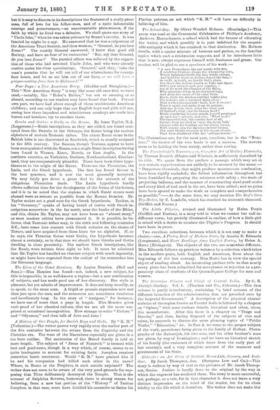Greeks and Goths : a Study on the Runes. By
Isaac Taylor, M.A. (Longmans.)—Runic inscriptions, as they are called, are found scat- tered from the Danube to the Orkneys, the Runes being the ancient alphabets of certain Teutonic tribes. The oldest Runic stone in the British Isles is one discovered at Sandwich, which is usually assigned to the fifth century. The Saxons, though Teutons, appear to have been unacquainted with the Runes, not a single Runic inscription having been found in Wessex, Essex, Mercia, or East Anglia. In the northern counties, as Yorkshire, Durham, Northumberland, Cumber- land, they are comparatively plentiful. There have been three hypo- theses as to the origin of the Runes. There are the Phoenician, the Latin, and the Greek hypothesis. The first has found favour in the best quarters, and is now the must generally accepted. We may fairly put down a great deal to the account of the ubiquitous Phoenician trade. The Latin hypothesis hardly allows sufficient time for the development of the forms of the letters, and it is to be noted that the regions in which Runic stones most abound were as remote as possible from the Roman frontier. Mr. Taylor makes out a good case for the Greek hypothesis. Tacitus, in his " Germany," speaks of having heard of tombs with Greek in. scriptions somewhere in the far north, near the banks of the Rhine, and this, thinks Mr. Taylor, may not have been an "absurd story," as most modern critics have pronounced it. It is possible, he be- lieves, that Teutonic tribes may, in the sixth and following centuries B.C., have come into contact with Greek colonies on the shores of "Thrace, and have acquired from them hints for an alphabet. If, as he says, the Thracian Getae were Goths, the hypothesis becomes almost a certainty, as in that case we should have Greeks and Goths dwelling in close proximity. The earliest Greek inscriptions, like the Runic, were written from right to left. It must be admitted that Mr. Taylor has handled an obscure subject with much ingenuity, as might have been expected from the author of the researches into the Etruscan language.


































 Previous page
Previous page